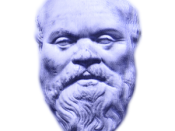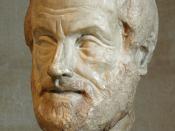Ethics is not only a branch of philosophy, but more so the base of philosophy. Socrates believed in the four Cardinal Virtues of the soul and he believed in the eternality of the soul. To make the soul eternal it must have a good balance between the four Cardinal Virtues of temperance, courage, wisdom, and justice. Taking that into consideration, ethics is the moral conduct of all living things; the science of morals. To be moral one must be just, temperate, and have reason; the four Cardinal Virtues. It is safe to say that Socrates believed that ethics and philosophy go hand in hand.
Socrates searched for justice and morals; he was the founder of Moral Philosophy. He questioned equality and justice and tried to search for the standard for justice. Socrates contemplated what was moral and what was not. Also, he challenged others to think of it as well.
One can see an example of this in Euthyphro. Socrates is talking to Euthyphro and questions, "Tell me then, what is the pious, and what the impious, do you say?" (Euthyphro 5d). This question alone tells the reader that Socrates was interested in what was moral and what was immoral, likewise, what is pious and what is impious. Socrates tries to figure an answer when he exclaims "Well then, what is dear to the gods is pious, what is not is impious" (Euthyphro 7a). Even hours away from his death Socrates is contemplating about what right and wrong is. Talking to Crito about escaping the jail cell Socrates states:
S: Well then, if one is oneself injured, is it right, as the majority say, to inflict an injury in return, or is it not?
C: It is never right.
S: Injuring people is no different from wrongdoing.
C: That is true.
S: One should never do wrong in return, nor injure any man, whatever injury one has suffered at his hands. (Crito 49c).
This quotation shows that even after being convicted and sentenced to death he is still philosophically contemplating what is right and wrong.
Even Aristotle believed in ethical and moral virtues. In section nine of Aristotle: from Nicomachean Ethics, Aristotle discusses the difference between taking pleasure in materialistic things and taking pleasure in virtuous actions. He states:
for, besides what we have said, no man is good who does not enjoy noble actions, nor would anyone call a man 'just' who does not enjoy acting justly, or call a man 'generous' who does not enjoy generous actions, and similarly in other cases. If this is so, then it is by their nature that actions according to virtue would be pleasant (96).
Through this quotation, Aristotle states that virtuous actions are enjoyable; being a moral and ethical human being will ultimately lead you to happiness. This also goes along with what was said earlier in the reading, "that which is pursued for its own sake is more complete than that which is pursued for the sake of something else" (section 5. 93). So, Aristotle believes that questioning one's actions and examining weather they are virtuous or not is striving to be ethical. This questioning and examining of one's life is the basis of philosophical inquiry.
Ethics and philosophy are basically one in the same. One cannot become ethical and virtuous without examination of one's actions. Also, one cannot live with a pure soul in accordance with the Cardinal Virtues without being ethical and moral.


